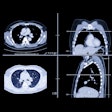
LONDON (Reuters), Jul 10 - Most female students are unaware that lifestyle factors can influence their risk of developing breast cancer, according to a survey released on Monday.
A poll of more than 10,000 students in 23 countries showed more than half knew heredity was a risk factor. But less than 5% realized that eating and drinking too much alcohol and not getting enough exercise also had an impact.
"It is very worrying that information about being overweight, having a high alcohol intake and taking little exercise has simply not been effectively communicated to young women in any of the countries we surveyed," Professor Jane Wardle, of the charity Cancer Research U.K., who headed the research team, said.
American students were the most aware that lifestyle could place a role in breast cancer.
Ten percent of Americans questioned in the poll published in the European Journal of Cancer knew alcohol was a risk factor compared to four percent in England, which was less than in Greece, Spain, and Colombia.
Female students in Iceland, Ireland, Greece, and South America were better informed about the link between lack of exercise and breast cancer than English students.
"The results of this study suggest that students could be overestimating the impact of genetic factors and are certainly underestimating the importance of lifestyle factors," Wardle added.
Breast cancer is one of the most common cancers in women. More than a million cases occur worldwide each year, according to the International Agency for Research on Cancer in Lyon, France.
The disease develops most often in older women. Factors that can also increase a woman's risk of the breast cancer include having a mother or close relative with the disease, early puberty, late menopause, and not having any children.
The contraceptive pill and hormone replacement therapy (HRT) after the menopause may also cause an increase in risk but it gradually returns to normal once a woman stops taking them.
Students in countries in Africa, Asia, Europe, and North and South America took part in the study.
Last Updated: 2006-07-10 11:11:11 -0400 (Reuters Health)
Related Reading
Global lifestyles, immigration patterns bring changes in breast cancer screening, April 14, 2006
Copyright © 2006 Reuters Limited. All rights reserved. Republication or redistribution of Reuters content, including by framing or similar means, is expressly prohibited without the prior written consent of Reuters. Reuters shall not be liable for any errors or delays in the content, or for any actions taken in reliance thereon. Reuters and the Reuters sphere logo are registered trademarks and trademarks of the Reuters group of companies around the world.
















